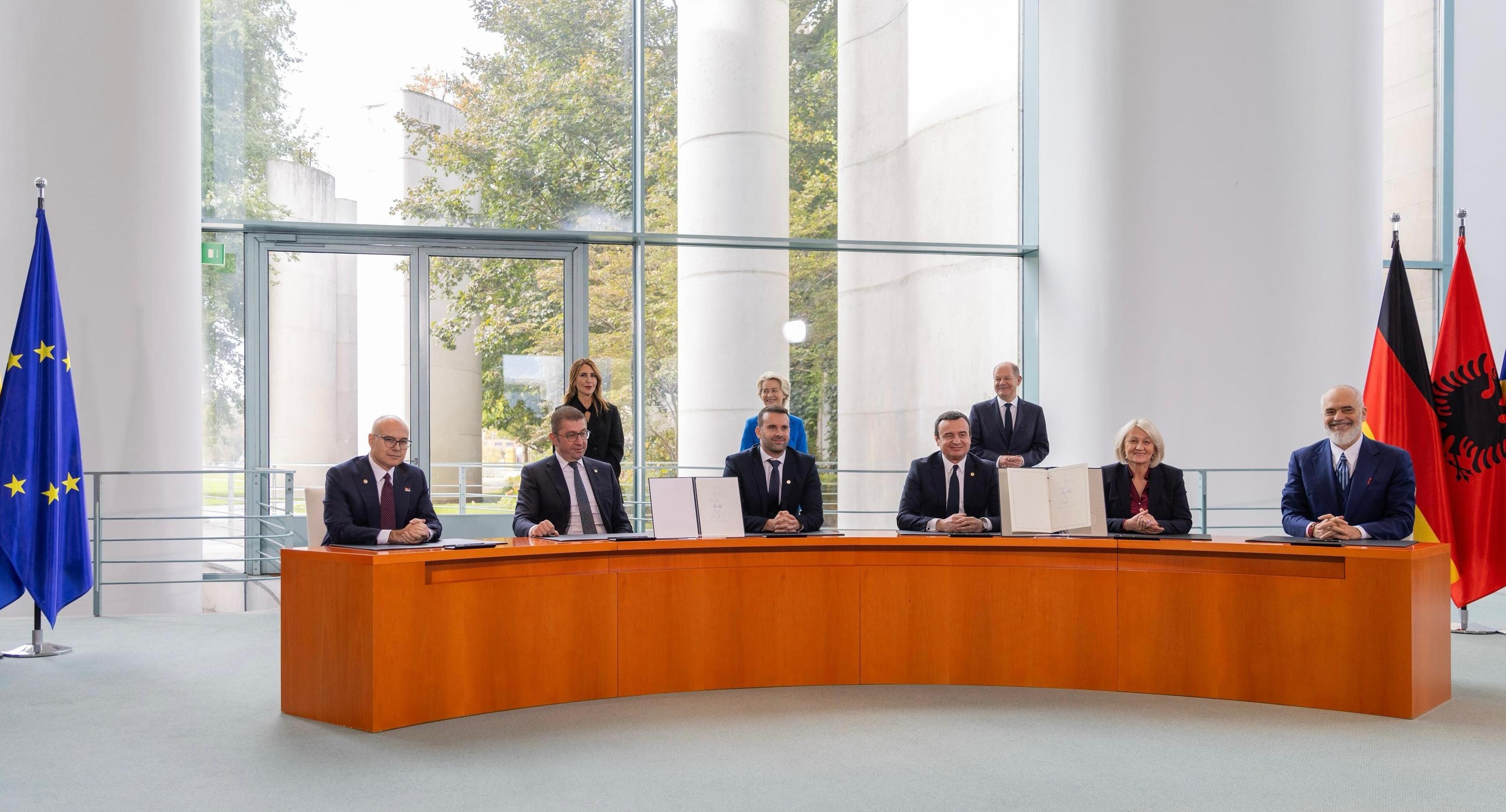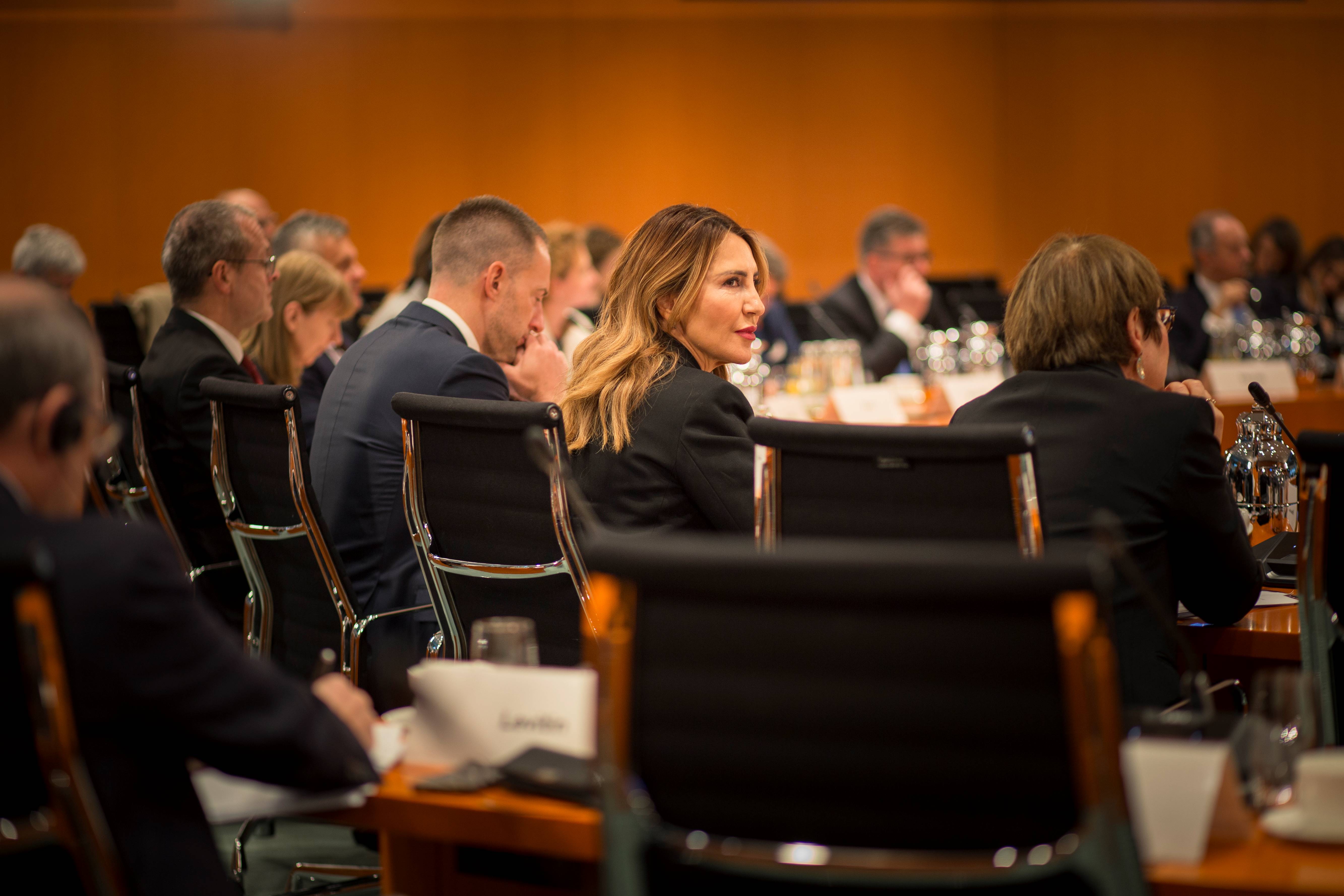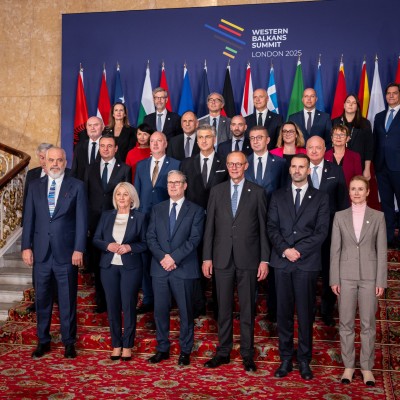Berlin Process: Western Balkan Six Leaders sign the New Phase of the Common Regional Market Action Plan Bregu: Common Regional Market is a key unifying regional cooperation framework of common good and interests in the global game
14 October 2024

10th Berlin Process Summit which took place on 14 October 2024 in Berlin marked by signing new phase of the Common Regional Market Action Plan by Western Balkans Six leaders (Photo: RCC)

RCC Secretary General Majlinda Bregu at the 10th Berlin Process Summit held on 14 October 2024 in Berlin (Photo: RCC/Elmas Libohova)
10th anniversary of Berlin Process marked by signing CRM 2.0
Berlin – The leaders of the Western Balkans Six signed a new phase of the Common Regional Market Action Plan 2025–2028 (CRM 2.0), commending the work of the Regional Cooperation Council (RCC) and partners in preparing the document, at the Summit marking the 10th anniversary of Berlin Process, held in German capital today. The leaders also signed the Agreement on Access to Higher Education and Admission to Study in the Western Balkans and adopted the Declaration on Research and Innovation Infrastructure Access and Collaboration, and the Declaration on Regional FDI Screening Standards.
“The leaders of the Western Balkans Six signed today the plan they have to stick to for the next 4 years – the second phase of Common Regional Market is a plan for sustainable growth. It is a key unifying regional cooperation framework of common good or common interests in the global game. Across almost all policy domains – from digital, trade, investments, innovation, green, etc. – that started to be visible during the first phase of CRM, the work on regional economic integration through the CRM plan signed today becomes firmly anchored in the new EU’s Growth Plan,” said RCC Secretary General, Majlinda Bregu at the Summit.
The Berlin Process leaders acknowledged the results achieved under the Common Regional Market 2021–2024, and RCC’s role in its facilitation, including freedom of movement with identity cards, mutual recognition of higher education and professional qualifications within the region, fully functional Roam Like At Home within the Western Balkans, reduction of data roaming charges between the EU and Western Balkan Six, progress towards Single Euro Payments Area (SEPA) membership, establishment of Green Lanes and reduction of waiting times, and applauded the efforts invested in strengthening regional cooperation. They emphasised the need for increased regional cooperation through the CRM 2.0.
“After 6 years of my tenure as RCC Secretary General, I can say that never has this region been as free and as conscious as it is now regarding the importance of cooperation. We all owe this situation largely to the process of EU integration. Common Regional Market is a great opportunity, but it has a fundamental challenge: to foster a common vision and a clear purpose of our future in Europe. As we work towards integrating markets we also cultivate a shared European identity, reducing the appeal of isolationist policies and highlighting the benefits of cooperation as the driving force behind progress. In the words of Jean Monet: “We are not forming a coalition of states, we are uniting people,” concluded Bregu.
The Agreement on Access to Higher Education and Admission to Study in the Western Balkans signed today is a new mobility agreement aiming to increase student mobility and grant them the right to study at accredited higher education institutions in the region. Together with the mobility agreements signed at the Berlin Process Summits in 2022 and 2023, this Agreement will further increase opportunities for free movement in the Western Balkans. The Declarations on Research and Innovation Infrastructure Access and Collaboration and on Regional FDI Screening Standards for the Western Balkan Six, adopted today, aim to promote research and innovation partnerships and foster a dynamic regional innovation ecosystem, and bring investment policy in line with EU norms and international best practices, respectively.
The Berlin Process leaders welcomed the results of the First Ministerial Meeting on the Green Agenda for the Western Balkans (GAWB), organised by the RCC last week in Hamburg. It resulted in endorsement of the Hamburg Declaration on the Green Agenda for the Western Balkans that renewed and strengthened the commitment of the Western Balkan Six to the full and timely implementation of the GAWB and its Action Plan 2021-2030, whose implementation is being facilitated and monitored by the RCC, with the vision to achieve climate-neutrality by 2050.
- Common Regional Market Action Plan 2025 – 2028 (CRM 2.0)
- Declaration on Common Regional Market 2025-2028
- CRM results so far
- More on CRM
- CRM 2.0 Factsheet
- Speech by the RCC Secretary General at the Berlin Summit 2024
- Agreement on Access to Higher Education and Admission to Study in the Western Balkans
- Declaration on Research and Innovation Infrastructure Access and Collaboration
- Declaration on Regional FDI Screening Standards



